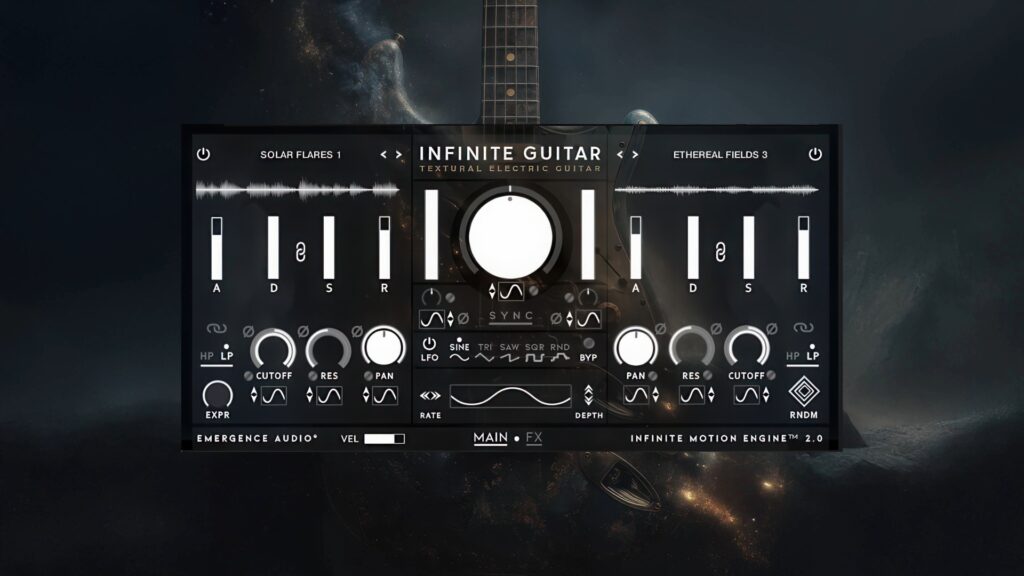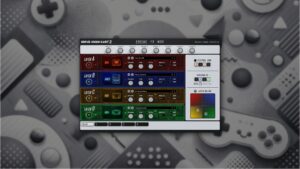When Emergence Audio releases something new, you can usually expect two things: a clear creative philosophy and a deep respect for subtlety. Infinite Guitar might be their most galactic interpretation of those ideas yet.
At its core, it’s not a library about riffs, solos, or showmanship. It’s about the quiet between notes, the resonance that lingers after decay, and the fragile boundary between sound and silence. It reimagines the electric guitar not as a tool for expression, but as a living atmosphere — something that breathes, shifts, and dissolves into space.
First Impressions — Between Motion and Stillness
On paper, Infinite Guitar is a 46 GB Kontakt instrument with over 260 presets and 53 sound sources, built around the Infinite Motion Engine 2.0 and Emergence Audio’s signature Non-Static Sampling process.
But what sets it apart isn’t the numbers — it’s the feeling.
Each sample in this library isn’t static; it’s recorded in motion. There’s an intrinsic movement built into every sound. As I described in the video:
“If you actually have interesting motion baked into the samples themselves, you get far greater textural gains — and that human, realistic X-factor.”
That “non-static” approach makes all the difference. Instead of layering modulation or effects to fake life into a sound, the motion is part of the DNA itself. Every note drifts, morphs, and reshapes itself naturally over time.
Even before diving into the presets, the concept alone gives you a sense that this library exists in its own emotional frequency — part realism, part dreamscape.
Design & Interface — The Illusion of Simplicity
Emergence Audio’s design philosophy has always been about mature restraint, and Infinite Guitar embodies that. The interface revolves around two sample layers crossfading through a large motion knob — simple at first glance, but deceptively powerful once you start exploring.
You can shape the flow with ADSR envelopes, filters, modulation, and a curated suite of effects — delay, convolution reverb, chorus, phaser, lo-fi, and a beautifully voiced tape saturator.
“Very little adjustments can amount to a lot.”
That’s exactly how it feels. You’re not endlessly tweaking; you’re sculpting motion. The subtle interplay between sample layers can shift the emotional center of a cue from tender to ominous with just a few gestures.
Even the interface’s minimalism has intent — it invites you to listen, not to look.
Sound & Character — Ambience as Storytelling
This library lives in the world between texture and tone.
Where traditional guitar libraries try to mimic performance, Infinite Guitar captures presence.
The Afterglow folder feels closest to a “real” guitar — still identifiable as a stringed instrument, but drenched in reverb and warmth.
“It feels like you’re actually picking the guitar yourself.”
The beauty here isn’t only in its realism, but in its restraint. The sounds bloom rather than attack, each pick resonating into a halo of space.
Then there are the Pads — vast, shimmering, and deeply cinematic. They embody what I called in the review:
“A beautiful contrast between the broken and the perfect.”
Many of these patches combine ethereal tonal washes with tearing tape saturation, creating a bittersweet duality — as if something sacred is dissolving at the edges.
The Pulses and Swells bring motion to the atmosphere, adding rhythm without urgency. They evolve organically, pulsing with life but never overpowering the mix.
And the Drones — dense, cinematic, and darkly glowing — were a personal favorite.
“They have this beautiful heft in the low end, just enough ominous weight to grab your attention.”
They move with quiet authority. The motion feels alive but unforced — perfect for scoring moments that need emotional gravity without clutter.
Philosophy in Sound
What I love most about Infinite Guitar is its sense of maturity. It never shouts. It trusts silence and space.
The sounds sit comfortably in that understated zone where atmosphere becomes emotion.
“A lot of these sounds aren’t trying to knock your socks off. There’s a very mature subtlety and minimalism to them.”
This restraint makes the instrument incredibly usable for film and game scoring, ambient composition, or textural production work. It thrives in those spaces where you need to say something powerful — without ever saying too much.
And philosophically, that’s what Emergence Audio seems to explore again and again: the tension between movement and stillness, between imperfection and beauty.
As I reflected in the video:
“You can really say a lot with a little with this thing. That’s actually really hard to do in audio.”
In many ways, Infinite Guitar feels like a sonic meditation on impermanence — tones that bloom, drift, and decay, much like breath itself.
Creative Use
As a composer, what makes Infinite Guitar special is how naturally it responds. The sounds don’t feel like loops or presets — they invite performance and exploration.
Play a simple chord and the sound world around it evolves almost by itself.
It’s easy to imagine using this in emotional drama, sci-fi atmospheres, slow-burn thrillers, or even as the harmonic bed of an introspective track. It fits anywhere that needs tension, fragility, or quiet awe.
Even when heavily reverberant or saturated, these sounds maintain clarity — the kind that allows them to sit beautifully under dialogue or merge seamlessly with orchestral and electronic elements.
Closing Thoughts
Emergence Audio has built a reputation on creating instruments that don’t just sound good — they mean something.
Infinite Guitar continues that lineage with grace.
It’s an instrument about motion and decay, about what happens after the note.
It’s not a library designed to impress you in the first ten seconds — it’s one that rewards patience, listening, and emotional intuition.
“It can say everything it needs to, without saying a word more.”
In a world obsessed with immediacy, Infinite Guitar is a reminder that sometimes the most profound sound is found in the spaces between.
🎸 Get it here: https://bit.ly/4npfPOy
Prefer Video?
Full review: https://youtu.be/NKqW0D8chLw
‘No talking’ demo: https://youtu.be/K5znyK6aESI





